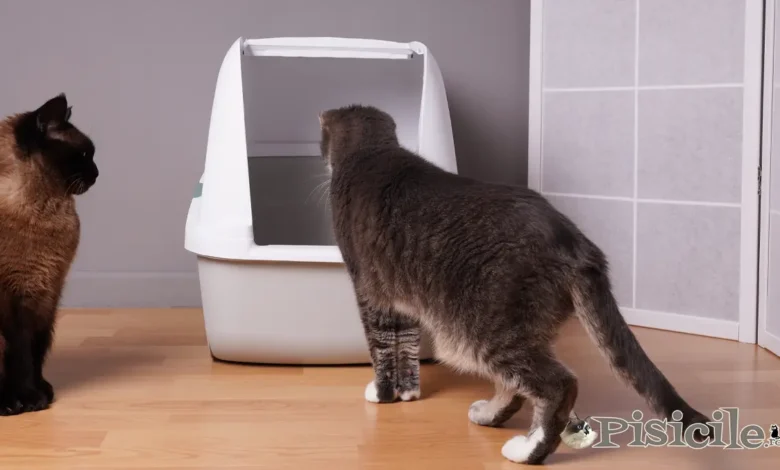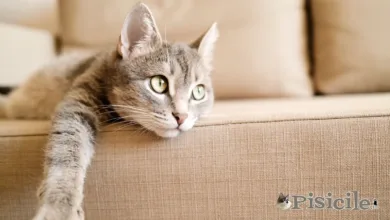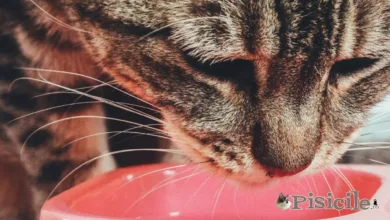
If the cat urinates outside the litter box it is a sign that something is wrong, and if you have a cat in the house, it is certainly not the most pleasant situation when your cat urinates on the bed, on the doormat or in other places of home. Most of the time, the cat does not urinate in the litter box either because of a behavioral problem or because of a medical problem.
Let's see a little where this behavior of the cat to cover its excretions in the litter box comes from.
Subject
How do cats know to use the litter box?
Normally, no matter how small the cat is, once shown the litter box, it will know how to go there on its own for its physiological needs. Defecation and urination.
Cats have a natural behavior of covering their feces and urine to protect themselves from potential predators. This behavior is rooted in their survival instincts. By covering the excrement, potential predators will not detect its smell and thus it will be protected. So, cats do not behave this way for hygiene reasons, but for survival reasons.
However, cats also care a lot about hygiene, and if the cat urinates outside the litter box, you should check that the litter box is clean.
The litter box can be a reason why the cat urinates outside the litter box
If your cat is uncomfortable in the litter box or cannot use it easily, there are several common problems that can cause the cat to find another location for its physiological needs:
1. The litter box was not cleaned well enough. If the litter box smells of feces and urine, the cat may refuse to enter it. Especially if it's a covered litter box that keeps the smell inside.
2. Too little or too much sand in the litter box. Cats usually prefer a 5-6cm layer of hygienic litter in the litter box, enough to cover urine and faeces.
3. The litter box is too small. If the litter box is too small for the cat, it may be tempted to look for other places around the house to defecate. The cat needs enough space to turn 360 degrees in the litter box and make a hole in which to urinate.
4. The house is too big for one litter box. In a larger house, at least two litter boxes are needed, especially in the case of houses with two floors.
5. More cats, more litter boxes. Normally, each cat should have its own litter box. I can tell you from experience that two cats can use the same litter box without problems, but there can be some more demanding ones who do not want to share the litter box with another cat. Which is why they might look for other places around the house to urinate and defecate.
Preferences for certain surfaces. Some cats develop preferences for defecating on certain surfaces, such as carpet, potting soil, or bedding.
Preferences or aversions to specific types of sand. Due to their sensitive senses, cats may be sensitive to the smell or texture of certain types of litter, which may cause them to avoid litter boxes with these materials.
Litter location preferences or aversions. Just like people or dogs, cats can have preferences about where they defecate. Thus, the incorrect choice of location for the litter can lead to its avoidance.
The inability to use the litter box. Older cats or those with certain physical limitations may have difficulty using certain types of litter. Choosing the right litter box model for their needs is essential.
Negative association with the litter box. Some cats may stop using their regular litter box due to associating it with a traumatic or painful event. For example, if the cat has had pain when urinating in the past, it may refuse the litter box for fear of experiencing discomfort again.
The stress. Changes in the cat's routine or environment, such as moving house, new family members or other pets, can cause stress and anxiety, causing her to avoid the litter box.
Conflicts in multi-cat households. In multi-cat households, a hierarchy in litter use can occur, and a dominant cat can cause stress and litter problems for the other cats.
Medical reasons why the cat urinates outside the litter box
In addition to behavioral and environmental issues, there may also be medical issues that cause the cat to urinate outside the litter box.
Urinary tract infections.
If the cat goes to the litter box often, but the amount of urine is very little, it may suffer from a urinary infection. In this case, it is recommended to consult a veterinarian.
Painful bladder syndrome or interstitial cystitis.
This neurological disease affects the cat's urinary bladder. Cats with interstitial cystitis may try to urinate frequently but without success. This condition can cause the cat to urinate outside the litter box due to the urgent need to urinate or the associated pain. As it is a serious and life-threatening disease for the cat, it is essential that it is treated properly.
Kidney blockages.
If the cat develops kidney stones or other types of blockages, it will try to urinate often, but without success. Such cases are extremely painful, so it is imperative to consult a veterinarian immediately in this situation.
What to do if the cat urinates outside the litter box
When cats urinate outside the litter box, there are several steps you can take to correct this behavior. The rule of thumb is to make sure the cat is comfortable in its litter box.
Keep the litter box clean. Cats prefer clean litter boxes, so make sure you clean it at least once a day. Change the bedding completely once a week and sanitize the box.
Opt for a spacious litter box. Most cats appreciate larger litter boxes that give them enough room to defecate.
Adjusts the sand level. Make sure the sand layer is about 5-6 cm thick, as this is a common preference of cats.
Avoid scented bedding. Most cats prefer unscented litters, so avoid those with strong scents.
Do not change the bedding too often. If possible, try not to change the litter very often, as some cats prefer to smell their own tracks in the litter box.
It provides a secluded but accessible place. Find a quiet but easily accessible place for the litter box so that the cat feels safe when using it.
Make sure you have enough litter. If you have more than one cat, make sure there are enough litter boxes for each.
Avoid placing the food bowl near the litter box. Cats prefer to have separate areas for eating and defecating.
Clean up all "accidents". Carefully remove any traces of urine or faeces from outside the litter box to prevent odor persistence.
Reduce the attractiveness of unwanted surfaces. If the cat develops a preference for certain surfaces, you can use carpets or aluminum foil or spray with citrus essential oils to make those surfaces less appealing.
Creates positive associations for the litter box. If the cat has developed negative associations with the litter box, try to provide pleasant experiences around it, such as moving the location of the litter box, playing near the box, or offering toys and treats.
Urine territory marking
Marking the territory with urine is a problem encountered especially in motans. This behavior has nothing to do with everything I said above, it is an instinct to defend one's own territory.
Cats mark their territory by urinating, an action that is based on communication rather than littering issues per se.
As they grow and mature, cats tend to explore and "claim" certain territories when they have the opportunity. Even though one motan can share the territory with another, they communicate with each other through different signals, and marking the territory by urinating is one of these signals. Through this action, a cat announces its presence in the territory and marks certain objects as owned by it.
Even though indoor cats don't have to forage and fight for survival, they can still communicate this way. However, the chances of them urinating outside the litter box are low if their environment is stable, without conflict, if they are spayed or neutered and do not need a mate.
If the cat has not been spayed and wants a mate, or has been disturbed in some way, then she may mark her territory with urine. This behavior helps them keep unwanted individuals away and create an atmosphere of familiarity and safety for her.
This territory marking "language" includes the following features:
- Urine is usually sprayed on vertical surfaces.
- The cat is leaning on a vertical object (such as a chair, wall or sofa), sitting with its body raised and its tail straight in the air.
- The amount of urine released is much less than in the case of regular urination in the litter box.
- Urine has a specific and very strong smell.
There are also certain characteristics of the cat or their environment that can contribute to urine marking:
- The cat is an unneutered male, although this action can also be done by females or neutered males, it is more common in those who have not been neutered, as it is also a way to find a mate.
- Having multiple cats in the same household increases the chances of having territory marking problems.
- There are conflicts between cats in the household, which can lead to marking the territory with urine.
In conclusion, if you notice that your cat is urinating outside the litter box, it is important to understand that this can be the result of several factors, but in many cases, the problem can be solved with patience and attention. The first crucial step is to rule out any underlying medical causes, such as urinary tract infections or other conditions. Once the medical issues are resolved, you can apply strategies to make the cat comfortable in its litter box, such as keeping it clean, ensuring accessibility, and using the right bedding. In addition, understanding behavioral reasons, such as territory marking, can help prevent urinating outside the litter box.
You may also be interested in: The cat takes the sand out of the litter box around the house. What to do?
With patience, attention and proper adjustments, it is possible to return to a harmonious and clean environment in your home, with your cat using the litter box properly.


